It was 45 years ago this month that US forces made a daring attempt, against every rule of risk management and every percentile of probability, to liberate 52 American hostages held in Tehran.
They failed. Operation Eagle Claw was spiked by a combination of mechanical failures, a surprise sandstorm, and execution miscues. But the knock-back sowed critical soil from which countless improvements in equipment, interoperability, and command relationships sprouted.
New units were formed from its lessons. New training devised. New platforms and technologies developed and fielded. Even new laws passed. Eagle Claw is one of the most important operational failures in US military history, its shadow longer than most successes.
But its most important lesson wasn’t penned into legislation or scribed into manuals. It was scribbled on the side of a case of beer gifted by UK forces to members of Delta Force and 8th Special Operations Squadron (SOS) shortly after its ill-fated conclusion.
“To you all from us all for having the guts to try.”
The original note was framed and hung in the 8th SOS ready room, with replicas proliferating throughout the joint special operations community.
It became a motto. A rallying cry for a community which built upon painful lessons to lay the groundwork for elite, world-altering impact in Grenada, Panama, Iraq, and the Balkans before becoming the varsity quarterback driving US military strategy in the post-9/11 period.
It moves hearts and minds because it perfectly captures American fighting spirit. Because it reminds us about two timeless principles.
First, that if great achievements were easy, anyone could do them. Greatness means tireless, restless commitment combined with aptitude and made relevant by team readiness at the critical moment.
And second, that greatness and boldness travel together. You can be meek and survive. You can be risk averse and still achieve many things. The world will still honor you. But greatness requires understanding the risks and still deliberately choosing to do something which has a high probability of failure, perhaps at great or total personal cost.
There’s a reason we equate our national fighting spirit with moral and physical bravery. Because gallantry derives from selflessness interlaced with self-belief to form that timeless fabric of team endeavor. When we’re looking out for one another, the universe catches us at our very best.
Thirteen years after Eagle Claw, Delta snipers Gary Gordon and Randy Shughart exemplified the guts to try, insisting repeatedly on insertion into a helicopter crash site swarming with the molten steel of a Mogadishu-wide firefight to provide cover to wounded teammates until a rescue could arrive.
They knew it was more likely than not they’d lose their lives in the ensuing action if the request were granted.
That’s exactly what happened. They died saving pilot Mike Durant’s life, and were posthumously awarded the Medal of Honor.
Most likely, you’ve heard that story. Likely you’ve been inspired by it. If you’re like me, you’ve wondered whether you’re doing enough to earn and deserve it.
Special people with uncommon courage move the world. And sometimes they do so by exceeding limits, which leads to the hard growth of recovery, redefinition of the limits themselves, or sometimes, self-sacrifice which rings across the ages.
New Terrain, Same Fight
Today we’re watching a different sort of battle unfold. The black smoke filling the sky isn’t from the wreckage of a special ops helo, but from the smoldering cinders of what remains of our civil-military traditions.
For a long time, a tradition of not just non-partisan but apolitical behavior within and with regard to the senior officer corps has kept us out of trouble. Presidents have always had practically unlimited latitude in choosing their most senior military leaders and advisors, but they’ve done so responsibly. Without imposing tests of political alignment or partisan loyalty. When inheriting someone whose jib wasn’t quite cut to their liking, they’ve usually just waited it out and replaced them in due course.
For example, Gen. Colin Powell was Chairman of the Joint Chiefs under George H.W. Bush, but was held over by Bill Clinton despite differences in their defense philosophies and Powell’s known disdain for Secretary of Defense Les Aspin, who he considered an unfocused ingenue.
But things started getting non-traditional later in the Clinton years. And since then, the norms of senior military advice and appointment have been under fire. You can read more about that here.
What we see now is a continuation. It’s only new in its intensity and brazenness. Senior officers are being fired left and right for political convenience. We’re left to speculate and infer about why because no explanations are given.
And the fact is, this fight we’re in today isn’t different from any other. We have teammates under fire. We have limits on what we can do about it within normal risk. Therefore, we have a decision to make. Sit safely within limits while they get smoked or lace up and do everything we can.
While the shots in this assault are being fired by politicians, their ammo is being loaded by others. Partisan interest groups have put together lists of officers they say should be fired. Every senior officer jettisoned thus far in this bewildering shitfest appears on one or more of these blacklists.
Now, if these blacklists were built using the yardstick of leadership and military effectiveness, this article would never have been born. Firing shitty generals and admirals is not controversial. To the extent it tries to be, stating that the firing occurred because their reach had exceeded their grasp would quickly dispel it.
But it’s in our human nature to flirt with oblivion, and occasionally take it out to dinner.
Since Jesus schlepped around Jerusalem in sage green sandals, there have been interest groups with overclocked yap-per-minute rates championing enshittification of anything and everything sacred. They’ve assaulted decency from every axis and represented every degree on the whole left/right ideological spectrum. Except for the dead-on-balls middle, which is the sole serene molecule in a universe which has been intent on choking itself since the moment it became sentient enough to channel collective action for stupid, misguided, or actively decrepit purposes.
In our better moments, there have been sufficiently sober and rational minds in responsible positions to maintain fire superiority over these imbecile formations.
But after a few decades of persistence and recruitment, enabled by our own collective torpor and Kardashianesque obsession with quarter-wits hocking expensive banality, they’ve broken the perimeter of sanity while we’ve been distracted. They are inside the wire.
Now, I don’t know why anyone with half a brain who cares about the common defense of our nation would listen to some collection of human marginalia with the military sensibility of a liquefied celery stalk. But that’s what’s happening.
Still, in this moment, the most destructive shock wave isn’t rippling from the loudness of the partisan explosion detonating our norms at the risk of our national defense. It’s rippling from the silent implosion of our joint chiefs, who have blown their own positions to smithereens by imitating common house plants while their teams are getting eviscerated.
At this point, I’ll narrow my field of view to the Air Force, because it’s where I focus, what I know best, and where my inside contacts mainly reside. This is in no way designed to downplay the tragic similarity with which its sister services are conducting themselves.
Hypotheticals can help sometimes. Let’s do one.
Let’s say you’re CEO of a big company. You’re summoned to a board meeting. The board says they have good news and bad news for you.
The bad news is that your predecessor, who moved to executive chair of the board, is getting fired. So too is the Senior VP who acts as your deputy. So too is your most promising Senior VP, who you promoted just a few months ago and positioned to ascend to your role in the future. No explanation is given for why.
These people were your closest colleagues. They ascended the corporate ladder with you. One of them hired you into your job. They are all personal friends. One was your mentor. You respect them all. Firing them should have been your decision, or at least something about which you were consulted. Firing them hurts your company. It creates operational problems. And no cause is given to you for why. It’s simply the board’s decision.
But the good news is, you can keep your job. As long as you’re willing to shut the fuck up.
No public kudos for their service to the company. No medal ceremonies or flyovers. No sweetly-worded emails or published tributes. Definitely no media interviews, public comments, answered questions, or personal opinions. You have to act like your friends and colleagues were never here.
People will speculate that they’ve done something wrong. Their CVs will have curiously short tenures in their highest roles that they’ll have to explain to protect their reputations. And you have to participate in their cancellation. Do that, and the board will show mercy.
So much as twitch, and you’ll be buried in an adjacent plot in the same professional graveyard.
Presented with such a scenario, it would be reasonable to conclude three things.
First, that you are not respected by your own board of directors.
Second, that you’re just as expendable as those who were fired, and it’s a matter of time before you’re also cashiered.
And third, the power of your position today is drastically reduced from the power you held yesterday. You are no longer permitted to render expertise or advice on matters central to the accomplishment of your role. You are untrusted. You are disempowered.
The choice is clear.
Be a stooge and stay comfortably latched to the corporate teat, at least for now. Or demonstrate the class and character that put you into your job in the first place, and send an important message requiring you to suffer no more than what your buddies already endured.
If you can feel that hypothetical, you’ll understand why I was compelled to label Air Force Chief of Staff Gen. Dave Allvin “Foxhole Norman” recently. And why I now double down.
Allvin’s mentor, predecessor, and previous boss has been fired. Allvin’s deputy has been fired. Lt. Gen. Jennifer short, who Allvin pushed into her third star and a key role just six months ago, also unceremoniously canned and sent into retirement.
And from Allvin, nothing. Not a whisper.
Someone’s going to tell me he’s doing all of his protesting in private, where it belongs. Unless the firing of his key people is some kind of metaphysical “Severance”-styled thing where they’re only fired privately but keep their jobs publicly, then there needs to be a public reaction.
Sticking with traditions is ill-fitted to non-traditional moments. The officers fired are public servants who held public positions serving the public. Allvin is in a public role being paid with public money. There needs to be a public recognition by the nation’s most senior airman of what these airmen delivered in a combined century of decorated service in difficult times.
If there was misconduct, or if someone wanted to retire rather than continue, or there is some other explanation capable of squaring the circle, then let’s hear it. Or at least a fragment of it. It could be leaked, as things usually are when it’s in the service’s interest.
Otherwise, there is no excuse for this dishonorable silence. It’s one thing to refrain from public protest. It’s another to pretend your friends are dead. Or that they never existed at all.
An interesting question is whether Gen. Allvin would attend the funerals of these officers if they did die. If he wouldn’t attend, that would be damning and damnable. If he would attend, it’s almost worse.
Because it means he’d be willing to lend his support only when it was too late, and when there was nothing left for him to lose or for them to gain.
Paraphrasing the great British philosopher Guy Ritchie from his crime caper The Gentleman, you can’t be king of the jungle and merely present yourself as king. You must be the king in word and deed. You can leave no doubt. Because doubt sows chaos, and chaos leads to your demise.
The metaphor doesn’t work perfectly because the Air Force is part of someone else’s jungle. But that’s maybe the point. By allowing civilians to take key authority away from senior officers, and by doing so publicly, our generals and the Congress currently watching them burn are fundamentally re-shaping how things work in this jungle.
We’re now going to test whether good order and discipline can be maintained by officers who don’t get to select their own teams. Who are not even free from the indignity of being forced to publicly stand by why their close confidants are professionally mauled by the dogs of politics.
Can a general govern a staff or a command or a service without moral stature? Having fed his closest teammates to the dogs, will he retain enough credibility and respect for anyone to listen to him?
We will find out. I wouldn’t be writing this if I thought the answer was good.
I think the law of this jungle cuts through to animal reality. As in, if you don't even have the power to watch my six, why the hell am I going to take any notice of you? I'll look after myself and you'll be irrelevant.
If generals like Allvin want to stay relevant, they must do the deeds that come with having stars on their shoulders. If you’re to have the power to command obedience, you must also demonstrate the power to protect the obedient. Once you stop protecting them, they’ll protect themselves. And a group obsessed with self-preservation cannot be organized into a selfless and thus potent military force.
No one will hitch themselves to Dave Allvin anymore. Nor to anyone who has hitched themselves to him. That wagon train is rumbling into the ditch. Because Allvin can no longer make promises about the future. He can no longer stabilize expectations. The people he champions cannot trust that their careers will be safe in his hands, or that he will do anything to protect them if things get dicey.
But it gets worse.
Allvin’s bosses know he’s been de-fanged. He’s given up the ghost. They can do as they please and he will not fight or even resist. Not directly, by making a statement contrary. Not indirectly, by floating a media story or leaking an anonymous report of his unhappiness. Not by sending his agents into legislative offices to quietly parlay for top cover.
They see him as a stooge. A useful beacon for re-transmitting their intent.
They don't respect him. If they did, things that have happened would have happened differently. And if they don't respect him, his days are numbered anyway.
On a human level, in thoughtful recognition of the morass in which he finds himself, I empathize with Gen. Allvin.
And I recognize he is not alone. The other services have displayed exceptional cowardice in the face of political pettiness. They've diminished the stature of their positions, or our services, of every man and woman who serves, by sitting silent while others have imposed an un-American norm by which power equals truth.
On a character and value based level, I have nothing but contempt and disgust for the inaction of supposedly great men while their teammates are savaged and the services they represent torn asunder.
The contrast between a Chief of Staff who stands idle and one who doesn't is easy to frame. Just remember the example of Gen. Ron Fogleman, who quit a year early rather than abuse a subordinate when the Clinton Administration scapegoated Brig. Gen. Teryl Schwalier for the bombing of Khobar Towers.
That's a contrast between leadership, which is about conviction, and the decrepit comfort of silent obedience in the trying moments. Which is just foxhole roosting.
Am I saying Dave Allvin should resign?
Well, maybe. I think he has to choose between bad and worse options.
Because building and cultivating and shaping and inspiring and leading the most important air service in the world requires more than staying out of trouble so you can win budget skirmishes and receive monetary pats on the head.
It requires moral authority of the species Fogleman is remembered for. His example carried the Air Force many planetary orbits of nautical miles after he was gone because of the thrust created by his example.
Complicity in the abuse of subordinates and respected peers cannot coexist with such an example.
So Allvin should either give up his role, or he should have the guts to try. To exceed the boundaries someone else drew for him and instead obey the dictates of conscience and model what it means to be a wingman.
Holding on to your job is overrated.
The real question is whether you can do more good by quitting and speaking candidly than by staying in your role and sitting in silence.
A good friend of mine, and 30-year special operator, puts it best when he says it’s better to fail right than succeed wrong.
America needs heroes. For a long time, we’ve watched heroes spill past prescribed limits in service to causes worth fighting for.
Some have perished but created a lasting and inspirational example. Others have failed and done the same. Occasionally, some have deliberately exceeded limits to find that doing so actually expands those limits.
Whatever Gen. Allvin and his peers choose to do, it mustn’t be to merely ride out a period of gradual rot, entropy multiplying within a closed system decaying from the inside. That can’t be what the decades past were preparing them for.
For the good of us all, let’s hope they have the guts to try.
TC is a retired Air Force officer who writes about leadership from the cheap seats while the targets of critiques continue the active melee. The views expressed here are his own, and do not reflect those of any other individual or organization.


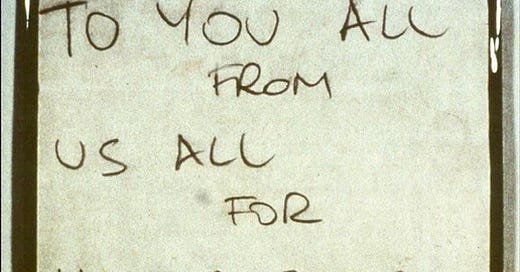



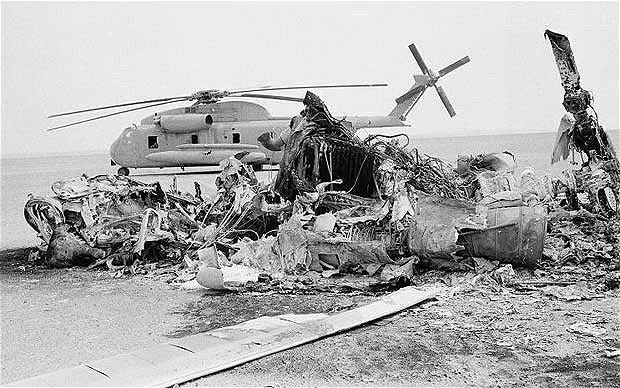


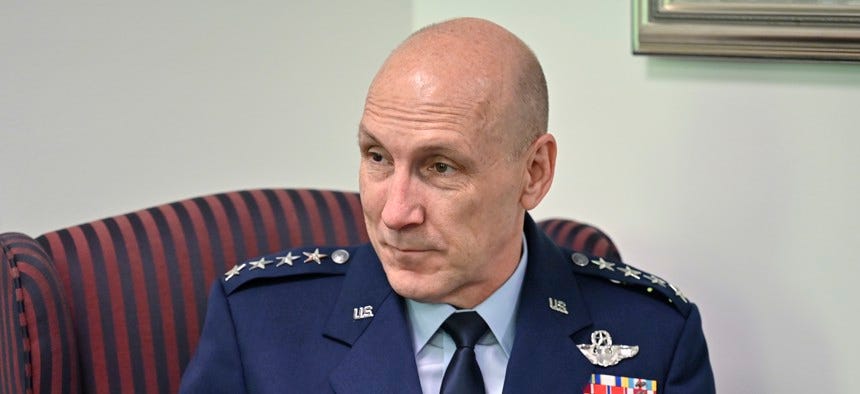
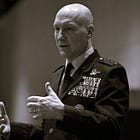
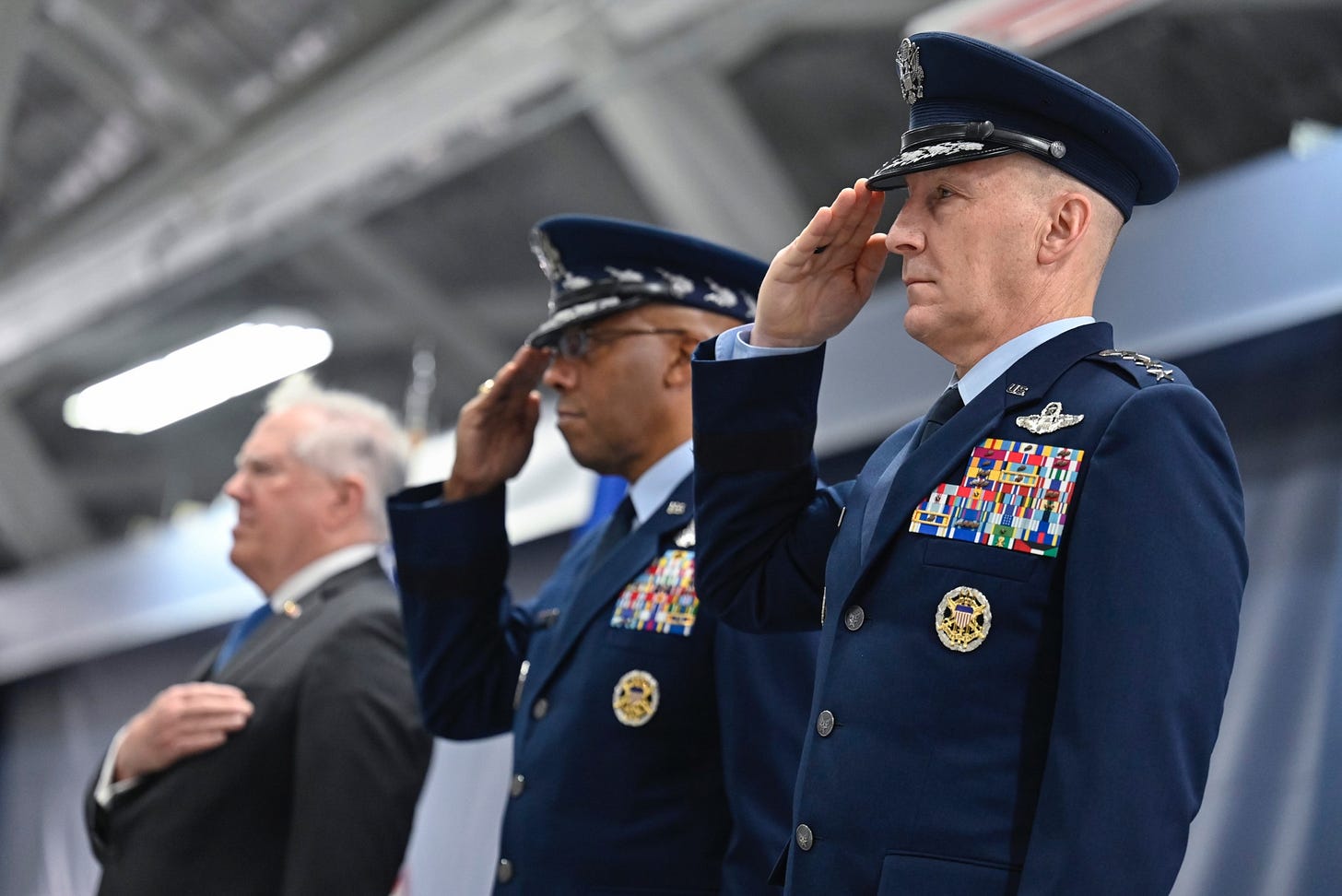

Tony, I’m a youngish Air Guard officer who usually enjoys your writings. I’m curious, were you so concerned when enlisted airmen were being kicked out of the military for vax refusal as you are about high ranking officers having to retire earlier than expected?
Your perspective is interesting, and I agree there are too many rollover general officers, but my perception has been largely of a convenient one-sidedness. There seems to be a pseudo-courageous resistance to one administration (it's popular in many circles to be so), while not saying a peep during the other that has exposed real nature of their spinelessness. I would also point out that the retired officer community seems to egg the situation on. A few examples:
-War Colleges, circa 2018: Speakers invited, and several student groups emerge, advocating for the invocation of the 25th amendment to expel the duly elected president of the US.
-CJCS speaking freely about his undermining of the president on several occasions (NDU, in print).
-GO's speaking with glee and with disregard for contemporary data on COVID rates in the DOD, as they rubber-stamp denials of vaccine exemptions. This was a widespread phenomenon at commands and bases all over. There was no mistaking their spinelessness and lack of judgment.
-Base CO undermining the VP after he's left the base.
-President using uniformed Marines to flank his campaign speech as he threatens and harangues the American people. Not a peep from the GOs on this use of the military.
These are just a few off the top of my head for this 5 minute post. Suffice to say, if I were a CEO who knew that large elements of leadership in my organization were working in league with media and others to undermine my ability to lead and make change, I would do everything in my power to change the people, and fast.